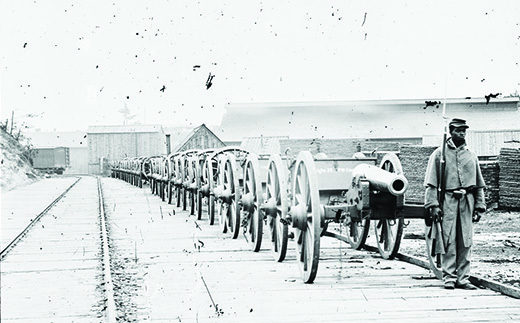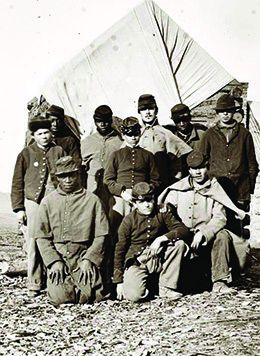| << Chapter < Page | Chapter >> Page > |
At the beginning of the war, in 1861 and 1862, Union forces had used contrabands, or escaped slaves, for manual labor. The Emancipation Proclamation, however, led to the enrollment of African American men as Union soldiers. Huge numbers, former slaves as well as free blacks from the North, enlisted, and by the end of the war in 1865, their numbers had swelled to over 190,000. Racism among whites in the Union army ran deep, however, fueling the belief that black soldiers could never be effective or trustworthy. The Union also feared for the fate of captured black soldiers. Although many black soldiers saw combat duty, these factors affected the types of tasks assigned to them. Many black regiments were limited to hauling supplies, serving as cooks, digging trenches, and doing other types of labor, rather than serving on the battlefield ( [link] ).

African American soldiers also received lower wages than their white counterparts: ten dollars per month, with three dollars deducted for clothing. White soldiers, in contrast, received thirteen dollars monthly, with no deductions. Abolitionists and their Republican supporters in Congress worked to correct this discriminatory practice, and in 1864, black soldiers began to receive the same pay as white soldiers plus retroactive pay to 1863 ( [link] ).

For their part, African American soldiers welcomed the opportunity to prove themselves. Some 85 percent were former slaves who were fighting for the liberation of all slaves and the end of slavery. When given the opportunity to serve, many black regiments did so heroically. One such regiment, the Fifty-Fourth Regiment of Massachusetts Volunteers, distinguished itself at Fort Wagner in South Carolina by fighting valiantly against an entrenched Confederate position. They willingly gave their lives for the cause.
The Confederacy, not surprisingly, showed no mercy to African American troops. In April 1864, Southern forces attempted to take Fort Pillow in Tennessee from the Union forces that had captured it in 1862. Confederate troops under Major General Nathan Bedford Forrest, the future founder of the Ku Klux Klan, quickly overran the fort, and the Union defenders surrendered. Instead of taking the African American soldiers prisoner, as they did the white soldiers, the Confederates executed them. The massacre outraged the North, and the Union refused to engage in any future exchanges of prisoners with the Confederacy.
In the final years of the war, the Union continued its efforts on both the eastern and western fronts while bringing the war into the Deep South. Union forces increasingly engaged in total war, not distinguishing between military and civilian targets. They destroyed everything that lay in their path, committed to breaking the will of the Confederacy and forcing an end to the war. General Grant, mastermind of the Vicksburg campaign, took charge of the war effort. He understood the advantage of having large numbers of soldiers at his disposal and recognized that Union soldiers could be replaced, whereas the Confederates, whose smaller population was feeling the strain of the years of war, could not. Grant thus pushed forward relentlessly, despite huge losses of men. In 1864, Grant committed his forces to destroying Lee’s army in Virginia.

Notification Switch
Would you like to follow the 'U.s. history' conversation and receive update notifications?